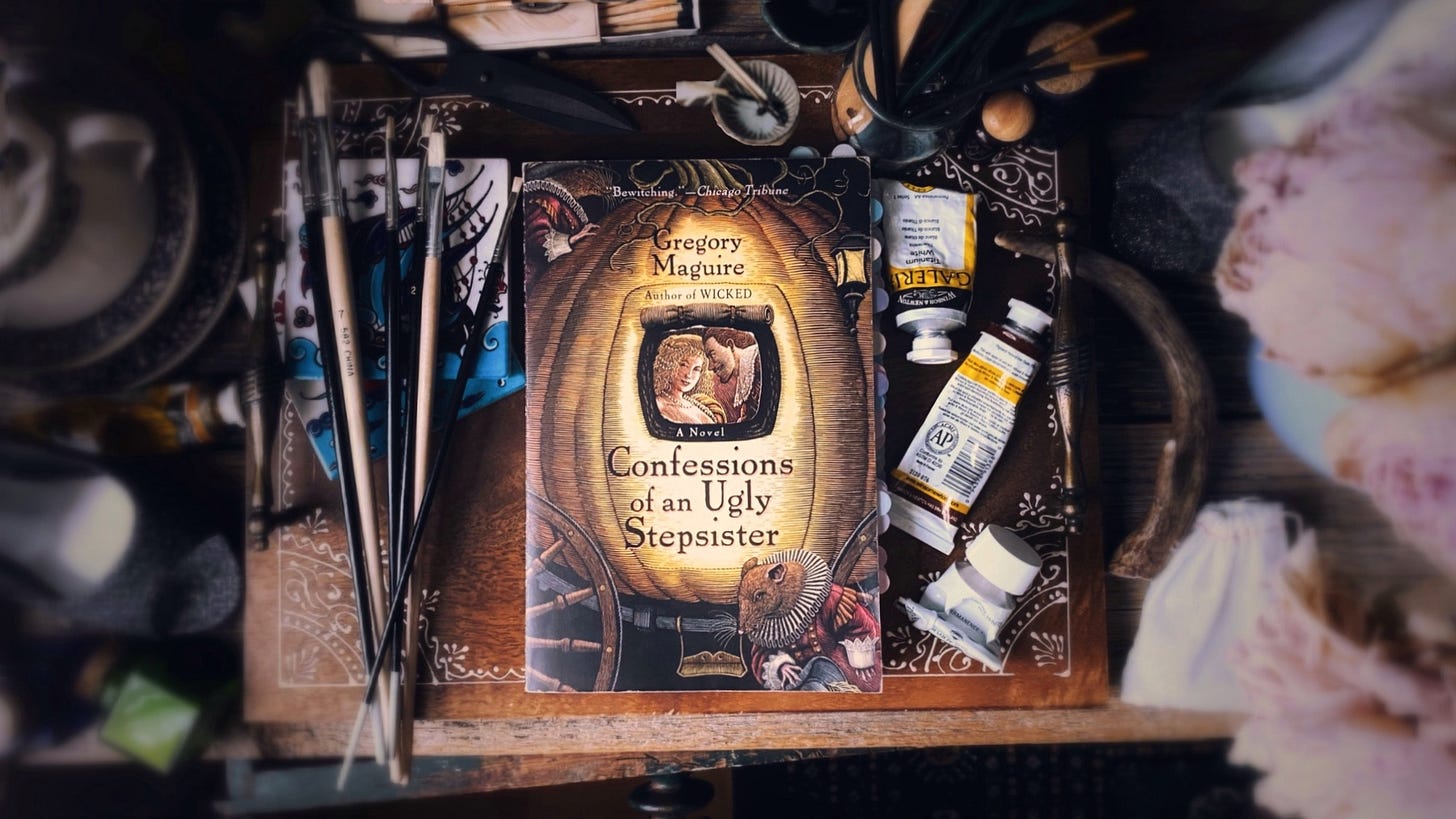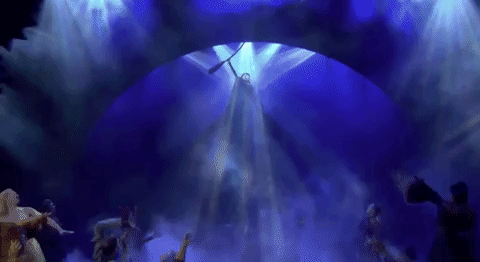“‘This is what stalks you,’ says Margarethe as the girls hurry after her. ‘This is the devil’s work. There’s nothing to anticipate but the broad scythe of the reaper that will cut you down. Only jump when it passes, and perhaps you may save yourself until the next sweep. If you don’t jump, you don’t save yourself.’
‘How high do you jump?’ says Iris to her mother.
‘Just you watch me,’ says Margarethe. ‘I’ve jumped from the fens of England to the threshold of the poorhouse of Haarlem, and then jumped again. Just you watch me, and you’ll learn what there is to learn. Give me room to cast my eel spear, and let follow what may.’
Then, she watches as Margarethe waits, and waits, and chooses the right moment to jump again.”
TITLE—Confessions of an Ugly Stepsister
AUTHOR—Gregory Maguire
ILLUSTRATOR—Bill Sanderson (wood-cuts)
AUDIOBOOK NARRATOR—Jenny Sterlin
PUBLISHED—1999 (interestingly the same year GIRL WITH A PEARL EARRING was published & they are somewhat similar stories…)
PUBLISHER—ReganBooks (HarperCollins)
GENRE—literary historical fiction—Cinderella retelling
SETTING—Haarlem, early 17th c.
MAIN THEMES/SUBJECTS—widow- & mother-hood in post-medieval european society, deformity & disability, looking & seeing, beauty as both holy & a kind of monstrosity, identity, the eye of a painter, changelings, tulip mania, the Dutch Golden Age, imperial commerce & capitalism (just a fancy term for “profiteering & exploitation”, Calvinism, a mother’s duty & protectiveness, daughters as extensions of their mothers—as the mother’s own selves, friendship & sisterhood, coming of age, dark stories & fairy tales, childhood trauma, charity & kindness as the real beauty, immortality through art
“‘You never did turn Master Schoonmaker into a slug!’ cries Iris gaily.
‘Eh? What’s that?’ The old thing is deaf from a multitude of scarves, and cursing her canes. ‘Let him turn himself into a slug. Most folks do.’
‘You were going to magic him!’
‘Why bother. It’s your own job to change yourself. These days it’s hard enough for a crooked old girl like me just to stay upright.’ But she peers a bit and grins, enjoying the fun as much as anyone.”
Blurbs: “Absolutely spellbinding. Ironic, sophisticated, almost supernaturally well written, this is one amazing novel.” — Bellingham Herald
“Gregory Maguire has applied his devilish writing style and vivid imagination to the story of the glass slipper, and, in doing so, turned this simple tale into a Gothic saga of 17th-century Holldan.” — Fort Worth Morning Star-Telegram
My thoughts:
I have always thought the story of Cinderella could be immensely improved by adding a hefty dose of darkness… & thanks to Maguire’s genius I see that I was correct. Also Jenny Sterlin’s narration for the audiobook was perfect. She matched the voice & tone of the narrator flawlessly & nailed all the voices without overdoing it too—especially Margarethe’s.
“Few writers match Gregory Maguire.” — Nashville Tennessean
Seriously whereee did this man learn to write like this?? It’s ridiculous!! Every single page is staggering. You can’t race through it because it’s so lovely & clever & subtle & so much is going on but at the same time you just want to inhale all of it all at once. Just look at this imagery & figurative language: “hobbling home under a mackerel sky,” & “the Master’s voice was distant-thundery soft,” & “he approaches the painting as a farmboy approaches a bull—gently, wishing it does not need to be done.”
& just in case you’re not interested in retellings because you already know how the story ends, the twist(/s) at the end of *this* story was wilddd. & so good & so on point. I was a bit sad about the abrupt ending of the main action though as I would have liked to have seen a few things actually fleshed out rather than just summed up by the narrator in the epilogue but I understand that that is in service to the fairy tale genre & it definitely worked from a story-telling POV… I just really liked Iris’s storyline & would have liked to have seen more of her life following that final moment in the story’s action, &, let’s be honest I never want any of Maguire’s books to end.
“‘No, my girl, you know nothing of how we women are imprisoned in our lives, but there are ways to determine the sentence we must serve. You’ll live to thank me.’
‘It’s cold-blooded,’ says Iris.
‘To be dead is more cold-blooded,’ says Margarethe.”
What most impressed me about this one though was the sheer number of subversive themes & subjects—from ideas about beauty & monstrosity, changelings & queerness, mothers & witches, wickedness & charity, family relationships (especially sisterhood), art & reality, wealth & happiness, piety & devotion… Not only was each one thoughtfully & intentionally explored, but they were constantly being melded together, connected, contrasted, & examined from multiple lenses & perspectives & in multiple contexts & situations.
On the theme/subject of BEAUTY & ART & IMMORTALITY, I was particularly interested in how Maguire interrogated the idea of “achieving immortality” through art: i.e. “Girl with Wildflowers” doesn’t capture the “real, true” Iris—it only captures her likeness, but her spirit is something that cannot be captured through the realist style of the Dutch Golden Age masters’ style of painting. & Schoonmaker is concerned that he is destined to be remembered only as the “Master of the Dordrecht Altarpiece”—& wonders what good/use is that kind of nameless immortality? Consider too that such immortality is offered, funded, & promoted by a man whose beautiful, sheltered daughter is the subject & who means for the painting to function as a sort of advertising campaign for his tulip imports business. Is that the kind of immortality that Schoonmaker prefers? The ‘Altarpiece’ is a work of religious reverence; ‘Girl with Tulips’ is a work of commercial advertising & realism, containing plenty of Schoonmaker’s talent yet non of his, nor anyone else’s, soul.
“‘She is a witch,’ says Iris, but it isn’t as if that is what she truly thinks—it’s merely a notion to venture upon the air, and to consider how such a sentence sounds. Does speaking a dubious thing make it more true? How shallow the words are, really—She is a witch. One might as well say, She is a mother, thinks Iris; that about covers the same terrain, doesn’t it?”
On the theme/subject of MOTHERHOOD I was completely absorbed in the way Maguire explored the intersection between the “mother” (both alive & dead), the “evil step-mother”, the “crone”, the “queen”, & the “witch” tropes in fairy & folk tales, & how all of them at one point or another can often be little more than a woman who is merely trying to survive in a time & age when the fate of the majority of women is one of injustice, suffering, captivity, anonymity, & impotence, & any assertion of character, desire, or will is met with suspicion & derision that only too quickly leads to ostracization, poverty, exploitation, & often, death… By the usual standards of such stories, Margarethe would easily be considered the villain of the story & certainly she makes some choices & does some things that could be considered “evil.” But I personally found her to be such a sympathetic character, especially as how she was presented through the eyes of her daughter, Iris (the narrator) who similarly saw the good & the bad, the hard & the soft, the kind & the cruel in her mother.
I won’t go into every theme (you could literally teach a whole class on this book 📚🎒🤓📓) but I will say that as much as this book tackled all kinds of issues & ideas, it never felt like Maguire was doing too much or leaving too much unexplored or unexamined or leaving any loose ends or conceptual plot holes. In many ways this story felt like what a fairy tale or folk tale might have originally been, the lessons it taught, the wisdom it shared, before it fell into the hands of the patriarchy.
I would recommend this book to readers who love beautifully written literary historical fiction with gothic vibes & themes/subjects of art, beauty, motherhood & sisterhood. This book is best read on audiobook & print together, & slowly, so you can appreciate every single flawless, stunning detail.
Final note: & that’s the last one for me from all of Maguire’s adult fairy-tale retellings back-list! & I am now ready to start the Wicked series (which I have been saving to read since I discovered Maguire’s books in 2018).
Which now consists of eight books including the prequel novel Elphie which comes out in March of next year. <3
“The Queen of the Hairy-Chinned Gypsies fixes an even gaze on Iris. Her look is neither remorseful nor angry. She’s uglier than Ruth or Iris herself could ever be, shriveled and pocked, horny of hand, brown of tooth. She leans on her canes as if she’s been walking the same road these thousand years. She says to Iris, And what will you make of yourself?”
CW // g-word slur, miscarriage & death in childbirth, kidnapping
Spice level: 🌶️
Season: any
Music pairing: I put on medieval town soundscapes & artist’s studio asmr ambience videos for this one because I was listening to the audiobook while reading along with the print book.
Further Reading:
everything else by Gregory Maguire—especially MIRROR MIRROR & HIDDENSEE
GIRL WITH A PEARL EARRING by Tracy Chevalier
TULIP FEVER by Deborah Moggach—TBR
THE STORY OF ART WITHOUT MEN by Katy Hessel (2023)—TBR; the cover design for this book is simple & subtle, but deep.
THE LAST PAINTING OF SARA DE VOS by Sarah Crichton (2016)—TBR
THE HOUSE OF FORTUNE by Jessie Burton (2022)—TBR
THE BOOKSHOP OF THE WORLD: Making and Trading Books in the Dutch Golden Age, by Andrew Pettegree (2019)—TBR
Check out my Reading List for all of my Cinderella-adjacent recommendations here!
I earn commissions from the sponsored links to my shop on bookshop.org which allow me to keep my content like Book Reviews & Reading Lists free to all subscribers. <3
All graphics, images, & photography © Stop and Smell the Books unless otherwise indicated.
Subscribe below to see more of my favorite quotes from this book!
Keep reading with a 7-day free trial
Subscribe to Stop and Smell the Books to keep reading this post and get 7 days of free access to the full post archives.






